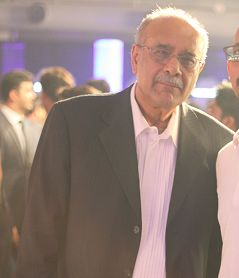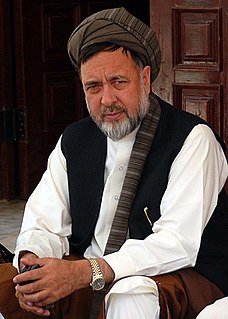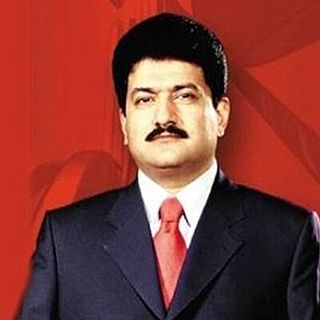Related Research Articles

Abdul Rashid Dostum is an Afghan politician and Marshal in the Afghan National Army who has served as Vice President of Afghanistan from 2014 to 2020. An ethnic Uzbek, he fought for the communist government and the Soviets and in 2001 was the key indigenous ally to US Special Forces and the CIA during the campaign to topple the Taliban government after the 9/11 attacks. He is regarded as a warlord and is known for siding with winners during different wars in Afghanistan. He is the founder of the political party Junbish-e Milli.

Mohammad Ismail Khan is a politician in Afghanistan, who served as Minister of Energy and Water from 2005 to 2013. He was previously the governor of Herat Province. He is widely known as a warlord because of his rise to power during the Soviet–Afghan War when he controlled a large mujahideen force, mainly his fellow Tajiks from western Afghanistan. He is a key member of the political party Jamiat-e Islami and was a member of the now defunct United National Front party.

Mullah Mohammed Omar, widely known as Mullah Omar, was an Afghan mujahideen commander who led the Taliban, and founded the Islamic Emirate of Afghanistan in 1996.

Najam Aziz Sethi is a Pakistani journalist, businessman and a former marxist who is also the founder of The Friday Times and Vanguard Books. Previously, as an administrator, he served as Chairman of Pakistan Cricket Board, caretaker Federal Minister of Pakistan and Chief Minister of Punjab, Pakistan.

Haji Muhammad Mohaqiq, born 26 July 1955 in Balkh, is a current politician in Afghanistan, serving as a member of the Afghanistan Parliament. He is also the founder and chairman of the People's Islamic Unity Party of Afghanistan. During the 1980s, he served with the mujahideen rebel forces fighting against the Soviet-backed Afghan government. After the withdrawal of the Soviet Union in 1989, Mohaqiq was appointed as the leader of the Hezb-e Wahdat for northern Afghanistan.

The Afghan Northern Alliance, officially known as the United Islamic Front for the Salvation of Afghanistan, was a united military front that came to formation in late 1996 after the Islamic Emirate of Afghanistan (Taliban) took over Kabul. The United Front was assembled by key leaders of the Islamic State of Afghanistan, particularly president Burhanuddin Rabbani and former Defense Minister Ahmad Shah Massoud. Initially it included mostly Tajiks but by 2000, leaders of other ethnic groups had joined the Northern Alliance. This included Karim Khalili, Abdul Rashid Dostum, Abdullah Abdullah, Mohammad Mohaqiq, Abdul Qadir, Asif Mohseni and others.

Hamid Mir is a Pakistani journalist, columnist and an author. Born in Lahore to a journalistic family, Mir initially worked as a journalist with Pakistani newspapers. Later, through the help of several political figures, most importantly PML-N gained popularity. He currently hosts the political talk show Capital Talk on Geo News. He writes columns for Urdu as well as English newspapers, both national and international.
Ghaith Abdul-Ahad is an Iraqi journalist who began working after the U.S. invasion. Abdul-Ahad has written for The Guardian and The Washington Post and published photographs in The New York Times, The Washington Post, Los Angeles Times, The Guardian, The Times (London), and other media outlets. Besides reporting from his native Iraq, he has also reported from Somalia, Sudan, Afghanistan, Libya and Syria.

Human rights in Afghanistan is a topic of some controversy and conflict. While the Taliban were well known for numerous human rights abuses, several human rights violations continue to take place in the post-Taliban government era. Afghanistan has an interesting strong human rights framework within its constitution.

This article covers the Afghan history between the Taliban's conquest of Kabul and their establishing of the Islamic Emirate of Afghanistan on 27 September 1996, and the U.S. and U.K. invasion of Afghanistan on 7 October 2001: a period that was part of the Afghan civil war that had started in 1989, and also part of the war in Afghanistan that had started in 1978.
The following lists events that happened during 2004 in Afghanistan.

Hezb-e Wahdat-e Islami Afghanistan, shortened to Hezb-e Wahdat, was founded in 1989. Like most contemporary major political parties in Afghanistan, Hezb-e Wahdat is rooted in the turbulent period of the anti-Soviet resistance movements in Afghanistan in the 1980s. It was formed to bring together nine separate and mostly inimical military and ideological groups into a single entity. During the period of the Afghan civil war in the early 1990s, it emerged as one of the major actors in Kabul and some other parts of the country. Political Islamism was the ideology of most of its key leaders but the party gradually tilted towards its Hazara ethnic support base and became the key vehicle of the community's political demands and aspirations. Its ideological background and ethnic support base has continuously shaped its character and political agenda. Through the anti-Soviet jihad and the civil war, Hezb-e Wahdat accumulated significant political capital among Afghanistan's Hazaras.
Abdul Qayum Karzai or Qayyum Karzai is businessman and politician in Afghanistan. He is the elder brother of President Hamid Karzai. His brothers also include the controversial Mahmoud Karzai and the assassinated Ahmed Wali Karzai, both embroiled by allegations of widespread corruption in Afghanistan and other serious charges. Abdul Qayum was a businessman in the United States before entering into Afghan politics. He served as a member of the Wolesi Jirga, the lower house of the National Assembly of Afghanistan. He retired due to health reasons and "reportedly been involved in back-channel peace diplomacy with the Taliban through Saudi Arabia."
Ahmad Omaid Khpalwak, also spelled as Ahmed Omed Khpulwak, was an Afghan journalist who worked for the Pajhwok Afghan News and as a freelance stringer for the BBC since 2008. After an investigation into his death, it was determined by the International Security Assistance Force that an American soldier had accidentally killed Khpalwak while clearing a broadcast building of terrorists while Tarin Kowt was under attack. Khpalwak was the third journalist from Pajhwok to be killed in three years. He was the third BBC reporter to be killed in Afghanistan and the second BBC reporter to be killed in the War in Afghanistan.
The persecution of Hazara people refers to discrimination against the Hazaras, who are primarily from the central highland region of Hazarajat in Afghanistan. Significant communities of Hazara people also live in Quetta, Pakistan and Mashad, Iran as part of the Hazara and Afghan diasporas.

The National Front of Afghanistan, or Jabh-e Melli, was established in late 2011 by Ahmad Zia Massoud, Haji Mohammad Mohaqiq and Abdul Rashid Dostum. It is generally regarded as a reformation of parts of the military wing of the United Front which with U.S. air support removed the Taliban from power in Afghanistan in late 2001. The National Front strongly opposes a return of the Taliban to power and retains significant military capabilities. The chairman of the National Front is Ahmad Zia Massoud, the younger brother of the Northern Alliance leader Ahmad Shah Massoud who was assassinated two days before the September 11 attacks in 2001.

Tipu Sultan is a Bangladeshi freelance investigative journalist who received the CPJ International Press Freedom Award in 2002. He was the victim of a widely publicised attack instigated by a local politician that almost cost him his life.
Waheed Muzdha was a senior Afghan political analyst, writer and a peace activist. He was also a poet and wrote several anti-Soviet poetry during the Soviet Afghan war. He was widely cited by various international newspapers for his views on Afghan conflict. During his career, Muzhda criticized both the Taliban and the Afghan government. Muzhda was praised as a probing intellectual by many journalists and scholars. He was assassinated on 20 November 2019 in Kabul. Several political observers and experts believe that Muzhda was assassinated for his views by pro-government groups as 'a part of campaign to silence people with different views'. Previously, he was reported to have been arrested by Afghan intelligence agency NDS.
Noor Ahmed Noori, often transliterated as Ahmad, was an Afghan radio journalist for Radio Bost FM station in Helmand province and for the New York Times. Noori worked as a translator from 2010 to 2013 and was killed in Afghanistan in 2014. Noori was the first journalist to be killed in Helmand in five years. Noori was also the first to be killed in a week that would be followed by several other killings in the Kabul area, including a suicide bombing the Taliban claimed responsibility for.
Daud Junbish is a BBC journalist. He is one of the few journalists in the world who has met former Taliban chief Mullah Omar, and has interviewed him on multiple occasions. He is the author of What Is Really Happening in Afghanistan?, 24 Hours That Turned Afghanistan Around, and Red Army in Afghanistan.
References
- 1 2 3 4 5 6 7 8 Cotts, Cynthia (25 November 2003). "Knifed in Kabul". The Village Voice . Archived from the original on 2 May 2014. Retrieved 3 February 2012.
- 1 2 3 4 5 6 7 8 "Afghanistan: Abdul Samay Hamed". Committee to Protect Journalists. 2003. Retrieved 3 February 2012.
- ↑ Lally, Kathy (3 December 2003). "Journalism, no matter the cost". The Baltimore Sun . Retrieved 3 February 2012.
- ↑ "CPJ International Press Freedom Awards 2011". Committee to Protect Journalists. 2011. Retrieved 3 February 2012.